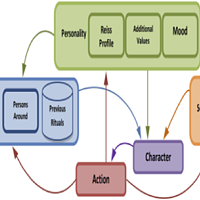iATTAC: A System for Autonomous Agents and Dynamic Social Interactions – The Architecture

Realistic social interactions are an important aspect for games since it helps to create immersion and engagement. Some games like Façade or Prom Week have an impressive AI engine for this, but it is not an approach that fits all games. In this paper we present iATTAC, a system for realistic autonomous agents and their social interactions. To realize this, the concept of rituals is used to define social interactions, and the agents are given a personality and emotions, as well as a personal agenda and a memory to keep track of previous activities and their success. iATTAC is originally designed to be used for educational games against cyberbullying, but its design is general enough to be usable in other games. We describe the theoretical basis used as well as the architecture of the system.
Publication Reference
Cebolledo, E., & De Troyer, O. (2015). iATTAC: A System for Autonomous Agents and Dynamic Social Interactions–The Architecture. In Serious Games (pp. 135-146). Springer International Publishing.


